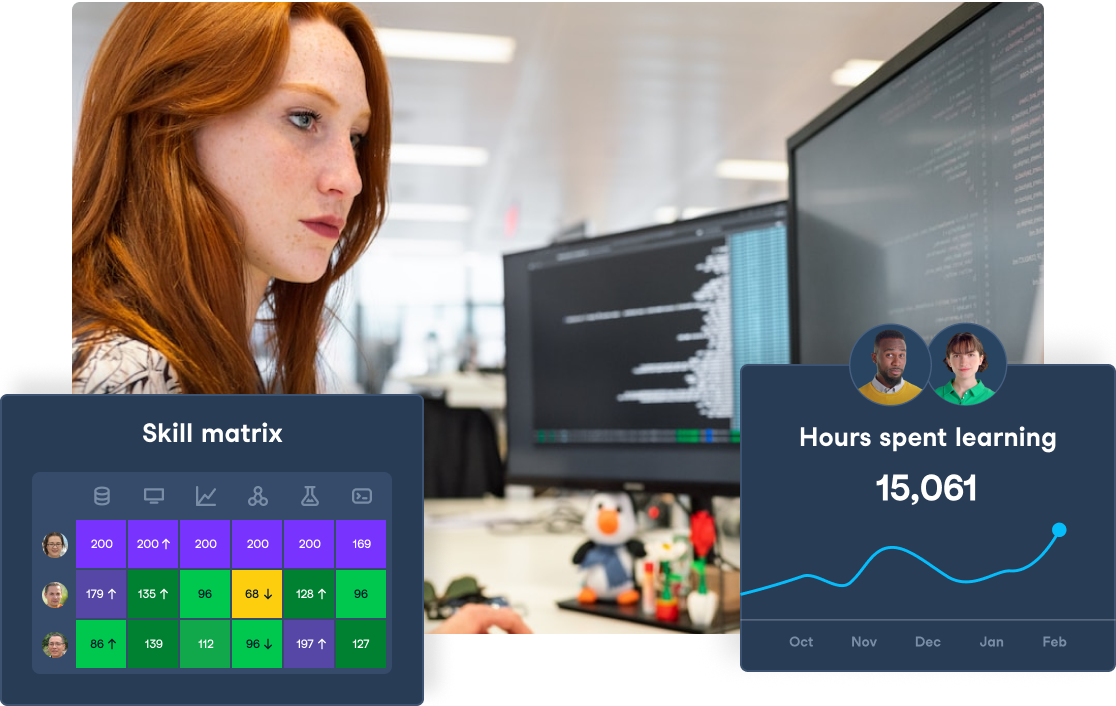Data roles are in huge demand. Plenty of stats show how the market is growing and will continue to grow. Research firm Fortune Business Insights predicts the global big data analytics market will grow to $549.7 billion in 2028. With an expanding data market comes an expanding need for employees and expertise in the space. Since 2016, there has been a 480% increase in data science jobs available, with demand from top industries including Finance, Healthcare, Sharing Economy Services, and even Entertainment.
The US Bureau of Labor Statistics expects data jobs to continue growing, with a 36% growth expected between 2021 and 2031. However, for organizations, it’s difficult to find and hire qualified talent. This guide explains why that is, and how DataCamp can help your business hire better. If you're looking to develop their internal data teams, check out our webinar on Building Effective Data Teams.
Advance Your Team's Data Science Skills
Unlock the full potential of data science with DataCamp for Business. Access comprehensive courses, projects, and centralized reporting for teams of 2 or more.

Why is it so hard to hire data scientists?
Amongst the many difficulties companies face when hiring data scientists and analysts, there are three overriding trends: the unmatched supply and demand for jobs, lack of specificity around data science jobs, and an unsuitable hiring process. The problem fundamentally comes down to three factors.
1. Demand for data talent
First of all, the demand for data talent far outstrips the supply of qualified candidates. This problem trickles down and catalyzes many of the issues in the data hiring process. It’s a simple supply and demand issue: there aren’t enough candidates to match the ever increasing amount of data jobs available. There is however a lot of interest and hype being generated around data jobs. For instance, data scientists ranked third on Glassdoor’s “50 Best Jobs in America for 2022” list, and incentives such as high salaries (between $75,000-120,000 on average for data analysts and scientists) have piqued the interest of many. However, this is creating our next problem: companies are choosing from candidates interested in the role, but not necessarily the right kind of candidates for data science. Quantity over quality.
2. Unspecific job adverts
So now companies are picking from a large pool of applicants, many unsuited to the role at hand. But is the role being advertised correctly? Oftentimes, no. Unspecific advertising attracts a likewise set of applications. Why does this keep happening? Job posts are often vague about these data roles because the company behind them doesn’t fully understand what data science is, and cannot differentiate between the different roles and their requirements. There is still a lot of ambiguity around data science, what kind of jobs it includes, and what kind of experience or skills are needed to meet the role. Hiring managers and recruiters must look for the right combination of tech and business skills required of analysts and scientists respectively. Without a proper understanding of the roles they’re hiring for, how can businesses hire the best data teams?
3. Unsuitable hiring process
Without a fundamental understanding of data science, the hiring process often misses the mark. For starters, companies are still using LinkedIn messenger and other messaging platforms as their primary tool to access candidates. Whilst this is a common route to headhunt potential employees, it’s not the most effective for scouting data scientists. With so many roles to fill, candidates are swamped with similar messages, and the chances of your business standing out amongst these reach-outs are unlikely.
This leads us to the next problem at hand: hiring managers don’t know how to evaluate data scientists. Quantifying experience in data science is not as straightforward as it may seem, and hiring managers are routinely focusing on one type of skill and not the other. Academic background is being revered over hands-on experience. Science and math skills are focused on, whilst problem-solving and soft skills, including business acumen, client management, and data storytelling, are overlooked. These experiences and skills are crucial to data science, however are being neglected in the selection process. This also means that senior candidates are not being distinguished from those with much less experience.
How to Hire Data Scientists and Data Analysts
Recruiting for data roles has become increasingly challenging. With a scarcity of qualified talent and a time-consuming assessment process, finding the right candidates can feel like an uphill battle. In this section, we'll explore the current state of hiring for data roles and provide general advice on how to improve your recruitment strategy.
1. Understand the demand and supply imbalance
The demand for data professionals continues to soar, driven by the expanding role of data in industries like finance, healthcare, and entertainment. According to research, the global big data analytics market is projected to reach $924.39 billion by 2032. However, the supply of qualified data scientists and analysts has not kept pace with this demand. Companies must recognize this imbalance and adjust their expectations, understanding that finding the perfect candidate may require time, effort, and creative solutions.
2. Be specific in job descriptions
One of the biggest mistakes companies make is posting vague job descriptions that attract a flood of unqualified candidates. To avoid this, clearly define the skills and experience required for the role. Differentiate between the various data roles—such as data scientist, data analyst, data engineer, and machine learning engineer—and tailor your job postings accordingly. This specificity will help attract candidates who are genuinely suited to the position. Check out our guides on data analyst job descriptions and data scientist job descriptions.
3. Streamline your hiring process
The hiring process for data roles often misses the mark due to a lack of understanding of the skills required. Avoid relying solely on traditional recruitment channels like LinkedIn, as these may not effectively reach the best candidates. Instead, consider using specialized platforms or working with recruiters who have a deep understanding of the data science field. Additionally, ensure that your evaluation process balances technical skills with soft skills such as problem-solving, business acumen, and data storytelling.
4. Prioritize hands-on experience
When evaluating candidates, prioritize those with hands-on experience over purely academic backgrounds. Data science is a practical field, and real-world problem-solving skills are often more valuable than theoretical knowledge. Look for candidates who have demonstrated their abilities through projects, internships, or contributions to open-source communities.
How Can DataCamp Help During the Hiring Process?
While the challenges in recruiting data scientists and data analysts can be daunting, organizations can take steps to streamline the process and ensure they are finding the right talent. Even though DataCamp is not currently offering recruit features, it still provides powerful tools to enhance your hiring strategy by focusing on upskilling and internal development.
Invest in upskilling your existing team
The demand for data professionals often outpaces the available talent pool. Instead of solely relying on external recruitment, consider leveraging DataCamp’s extensive library of courses and projects to reskill and upskill your current employees. By developing data science and analytics skills within your existing team, you can bridge the talent gap and create a pipeline of qualified candidates from within your organization.
Tailor training to specific data roles
One of the common hiring pitfalls is a lack of clarity around the specific skills required for data roles. DataCamp offers specialized learning paths that can be tailored to the exact needs of your business. Whether you're looking to develop expertise in data analysis, machine learning, or data engineering, you can create customized training programs that ensure your team is equipped with the precise skills necessary for their roles.
Streamline candidate evaluation
Evaluating candidates for data roles can be challenging, especially when it comes to assessing both technical and soft skills. By utilizing DataCamp’s learning platform, you can set up targeted assessments and projects that mimic real-world tasks. This allows you to evaluate the capabilities of potential hires or internal candidates more effectively, ensuring they possess the right mix of technical proficiency and problem-solving abilities.
Leverage DataCamp’s Certification program
DataCamp’s rigorous certification process ensures that learners are well-prepared for the demands of data roles. You can benefit from the certifications by prioritizing candidates who have completed DataCamp’s courses. These certifications serve as a reliable indicator of a candidate's competency in various data, analytics, and AI disciplines.
Foster a culture of continuous learning
The field of data science is constantly evolving, and staying ahead requires continuous learning. Encourage your team to engage with DataCamp’s ongoing learning opportunities, including new courses, projects, and community resources. This commitment to lifelong learning not only enhances your team's capabilities but also makes your organization more attractive to top talent who value growth and development.
By focusing on upskilling and creating a robust internal training program with DataCamp, you can mitigate the challenges of recruiting in a competitive market. Empower your team to grow from within, and transform your hiring process from a reactive scramble into a strategic advantage. Get started for free today.
Empower Your Team with Data Analysis Expertise
Enable data-driven decision-making with DataCamp for Business. Comprehensive courses, assignments, and performance tracking tailored for your team of 2 or more.


A senior editor in the AI and edtech space. Committed to exploring data and AI trends.


